![]()
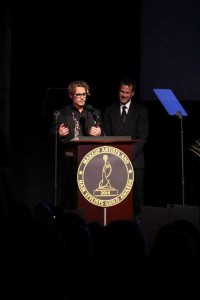
In the evening’s first and most emotional award, Dick Smith, though not present due to illness, was given a Lifetime Achievement Award for his considerable work in television at NBC in New York from 1945-1961, followed by his run of films from 1961 until his semi-retirement from film sets at age 65 in 1987. Now 91, Smith has received due accolades from unions such as Local 706 in Los Angeles and Local 798 in New York, plus a recent special award granted by the Academy of Motion Picture Arts and Sciences. His high points in makeup work might arguably be with TV’s Dark Shadows, the 1970s classic films Little Big Man, The Godfather, The Exorcist and 1984’s Amadeus, for which he received his first and only Oscar for best makeup.
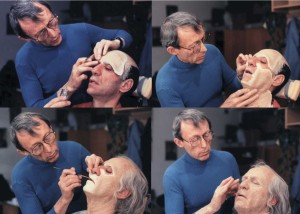
Given that Baker is Smith’s close protégé and friend, giving him the award meant something special. “Dick’s always been kind of like a second father to me,” he said. “Unfortunately, he’s frail now. He’s 91-years-old. I’m reliving that whole thing at the end of my father’s life. That part’s not a lot of fun. Unfortunately, he can’t be here tonight. I am kind of sad about that.”
Awards were given out for outstanding achievements in the creation of characters in various categories – including special makeup effects work, contemporary work and period work – for both makeup artistry and hair styling across all entertainment-driven areas. Despite the proliferation of digital techniques, the application of makeup and hair designs onto actors is still a vital aspect of any production, large or small.
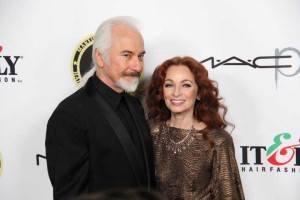
Deborah Patino-Rutherford, who won an award for her period makeup on the made-for-cable TV movie Behind the Candelabra, noted, as the crowd drifted into the Paramount Theater, that these awards were unique, apart from the Oscars which give only give one overall award for best makeup. “We can feature more the different types of makeup that there are, the different categories of the best makeups of the year,” she said.
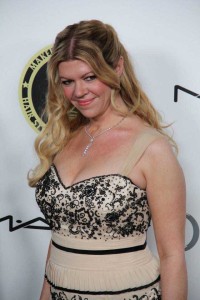
When asked how her Makeup Artists and Hair Stylists Awards nomination compares to her Oscar nomination for Dallas Buyers Club, Mathews reflected, “This doesn’t have any of the stress of the Oscars. I’m here just to say hello to my friends, and hang with them, and say ‘Thank you so much.’ The fact that our film is recognized is way in the background of what I’m concentrating on right now.”
The Walking Dead, AMC’s wildly successful zombie-themed show, won an award for best special makeup effects, including makeup supervisor Greg Nicotero, who has also directed seven episodes of the show, and Jake Garber, who does key zombie makeups. “They only had two people on the ticket, so I have to give props to other makeup artists on the show, such as Andy Schoneberg, Kevin Wasner, Garret Immel, and our locals that help out as well,” Garber said before showtime, explaining how his show’s zombies, shot on location in Georgia, are different from other zombies in film and TV. “The coloration is a little different than a lot of them, and we are trying show some sort of decay as the seasons go on. There are not as plump – their food source is starting to dry up. We try to change it up a little bit.”
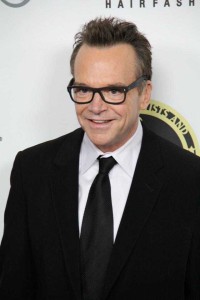
When prompted about possible digital enhancements or replacements of his Bad Grandpa makeup, Prouty bristled. “It had to fool people in real life. The movie hinged on the fact that we were going to pull the wool over these people’s eyes every day of the shoot,” he said. “I don’t think there’s any way that they could have done that digitally. What was nice too is I was working with a production company who never did any digital cleanup either. So there was never anything done in post. What you see on the screen is what we shot, exactly frame for frame.”
Lastly, show attendee Dave Elsey, who won an Oscar for his realization of special makeup effects along with Rick Baker on The Wolfman (2010), noted that prosthetics are still a viable means of making a movie with special characters. “They elevate everything else in the film,” he said. “It’s like if you walk onto a great set, or if an actor has a great prop, or if he’s wearing a great makeup — it elevates the performances of everyone in the room. It makes everybody on set raise their game. It’s very difficult, I think, for actors to have to imagine everything, to walk onto a big greenscreen and have to act against nothing. It can be done, but it’s much better if you can see the thing that you’re performing against, and that you can touch it, and see that it’s real. And I think it always will be for many more years.”





